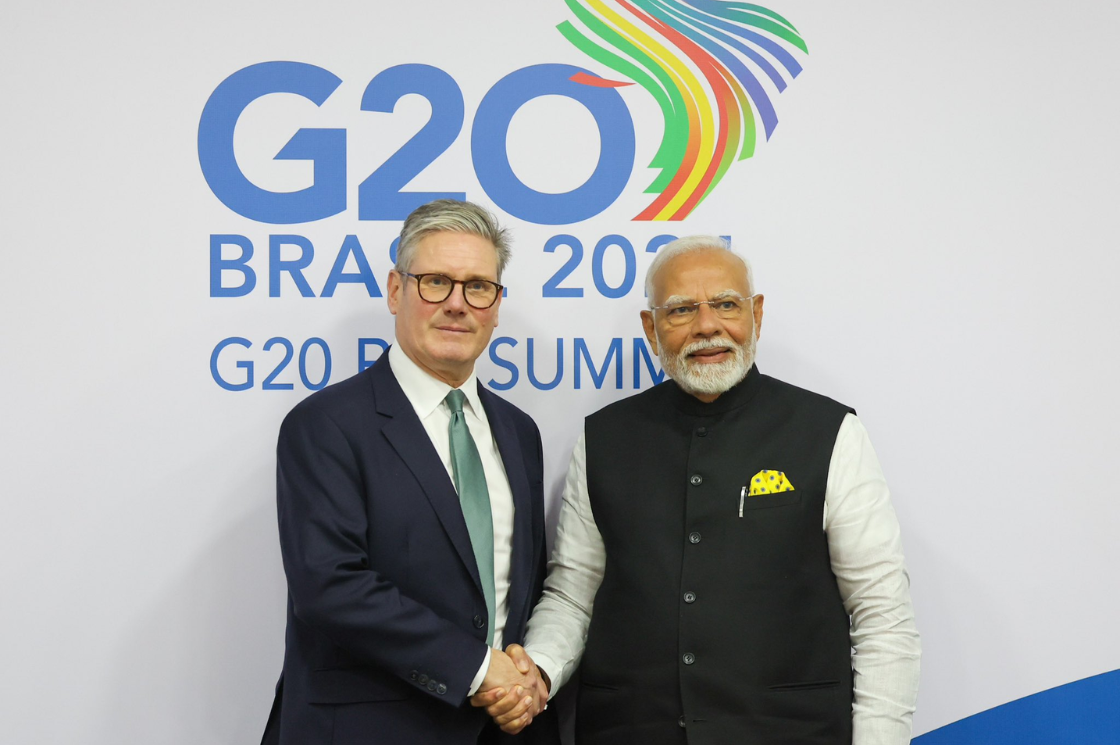
(Photo : narendramodi-X)
On Monday, Prime Minister Narendra Modi had his first meeting with British Prime Minister Keir Starmer since Starmer's election. The leaders met on the sidelines of the G20 Summit in Rio de Janeiro, Brazil.
According to a statement from 10 Downing Street, "The UK Prime Minister announced that UK-India trade negotiations will restart early next year, following a bilateral meeting with Prime Minister Narendra Modi at the G20 summit."
Modi brought up the topic of extraditing economic offenders sought by India during his meeting with Starmer. He also announced the establishment of two new Indian consulates in Belfast and Manchester to strengthen economic and business relations. This will increase the total number of Indian consulates in the UK to five.
In a post on X, Modi said he had an "extremely productive meeting" with Starmer. "For India, the comprehensive strategic partnership with the UK is of immense priority. In the coming years, we are eager to work closely in areas such as technology, green energy, security, innovation and technology. We also want to add strength to trade as well as cultural linkages," he said.
Prime Minister Keir Starmer emphasized the significance of the UK's global trade partnerships, highlighting their role in fostering domestic economic growth. He stated, "Boosting economic growth is key to improving living standards for working people. A new trade deal with India will support jobs and prosperity in the UK," underscoring the mutual benefits an FTA could bring.
As the world's fifth-largest economy, India is an important partner for the UK, with the proposed agreement aimed at job creation, increased investment, and better market access for both countries.
Overview of UK-India Trade and Investment Relations
Total trade in goods and services (exports plus imports) between the UK and India was £42.0 billion in the four quarters to the end of Q2 2024, an increase of 9.7% or £3.7 billion in current prices from the four quarters to the end of Q2 2023. Of this £42.0 billion:
Total UK exports to India amounted to £16.6 billion in the four quarters to the end of Q2 2024 (an increase of 7.2% or £1.1 billion in current prices, compared to the four quarters to the end of Q2 2023);
Total UK imports from India amounted to £25.4 billion in the four quarters to the end of Q2 2024 (an increase of 11.3% or £2.6 billion in current prices, compared to the four quarters to the end of Q2 2023).
India was the UK's 11th largest trading partner in the four quarters to the end of Q2 2024 accounting for 2.4% of total UK trade.
In 2022, the outward stock of foreign direct investment (FDI) from the UK in India was £20.1 billion accounting for 1.1% of the total UK outward FDI stock.
The inward stock of foreign direct investment (FDI) in the UK from India was £10.2 billion accounting for 0.5% of the total UK inward FDI stock.
UK Business and Trade Secretary Jonathan Reynolds highlighted the importance of the relationship, stating, "India is a vital trading partner for the UK. We believe there is a good deal to be done here that works for both nations."
The FTA, through tariff elimination and increased investment opportunities, has the potential to generate new jobs and stimulate economic growth for both countries.
Strategic Implications of FTA Agreement
The agreement will give an edge to both countries in the complex global dynamics. The potential agreement could also pave the way for deeper collaborations in technology, green energy, security, and innovation, aligning with global economic shifts towards sustainability and resilience.









